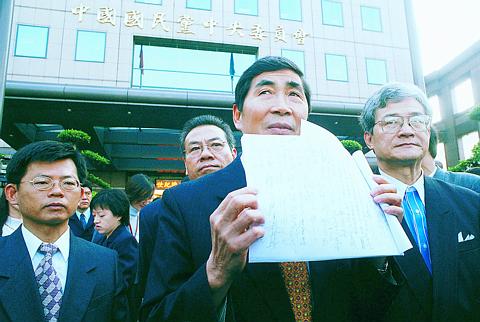DPP lawmakers yesterday accused the KMT of stealing more than US$100 million in US economic aid in the 1970s and channeling the money to its party-owned business empire.
As part of the DPP's continuing campaign to shed light on KMT assets which the opposition party alleges were obtained illegally, DPP lawmaker Cheng Pao-chin (鄭寶清), who leads a task force called the KMT Assets Reclaiming Agency, made public a finance ministry document from 1976 to support his accusation that the KMT had misappropriated aid money.
"The Bankers Trust International Limited based in the US loaned Taiwan's government US$100 million at a low interest rate -- 1.75 percent -- to be used in assisting state-run businesses," Cheng said.

PHOTO: CHIANG YING-YING, TAIPEI TIMES
"But the KMT took that money and invested it in party-run businesses, including the China Development Corp [now China Development Bank, CDB], the Broadcasting Cooperation of China [BCC], and China Airlines [CAL]," he said.
According to other documents that Cheng revealed yesterday, the KMT took US$86.1 million from the 1976 aid package -- which included the low-interest loan -- and invested it in CAL.
Some of the documents were signed off by former Minister of Finance Fei Hua (
Cheng appealed to the government to take back ownership of CAL and list it as a state-run business.
DPP lawmaker Yeh Yi-chin (
"We can see from those documents that China Development Corp had already taken about US$20 million as of Dec. 31, 1976. We want to ask whether the KMT has returned that money, and why the government has to borrow money to help the KMT's party-run businesses," Yeh said.
Meanwhile, 126 lawmakers, including 34 KMT legislators, 68 from the DPP, 10 from the New Party, and 13 independents, signed a petition demanding that the KMT make public its assets before the March presidential election.
DPP lawmaker Trong Chai (
"Especially those assets taken from the Japanese government after Japan ended its rule over Taiwan should be returned to the people," Chai said.
KMT lawmaker and party official Chen Hung-chi (
"We certainly plan to make public our assets. And we will accomplish it as soon as possible because we do underestimate people's expectations," Chen said.

INVESTIGATION: The case is the latest instance of a DPP figure being implicated in an espionage network accused of allegedly leaking information to Chinese intelligence Democratic Progressive Party (DPP) member Ho Jen-chieh (何仁傑) was detained and held incommunicado yesterday on suspicion of spying for China during his tenure as assistant to then-minister of foreign affairs Joseph Wu (吳釗燮). The Taipei District Prosecutors’ Office said Ho was implicated during its investigation into alleged spying activities by former Presidential Office consultant Wu Shang-yu (吳尚雨). Prosecutors said there is reason to believe Ho breached the National Security Act (國家安全法) by leaking classified Ministry of Foreign Affairs information to Chinese intelligence. Following interrogation, prosecutors petitioned the Taipei District Court to detain Ho, citing concerns over potential collusion or tampering of evidence. The

‘FORM OF PROTEST’: The German Institute Taipei said it was ‘shocked’ to see Nazi symbolism used in connection with political aims as it condemned the incident Sung Chien-liang (宋建樑), who led efforts to recall Democratic Progressive Party (DPP) Legislator Lee Kun-cheng (李坤城), was released on bail of NT$80,000 yesterday amid an outcry over a Nazi armband he wore to questioning the night before. Sung arrived at the New Taipei City District Prosecutors’ Office for questioning in a recall petition forgery case on Tuesday night wearing a red armband bearing a swastika, carrying a copy of Adolf Hitler’s Mein Kampf and giving a Nazi salute. Sung left the building at 1:15am without the armband and apparently covering the book with a coat. This is a serious international scandal and Chinese

Seventy percent of middle and elementary schools now conduct English classes entirely in English, the Ministry of Education said, as it encourages schools nationwide to adopt this practice Minister of Education (MOE) Cheng Ying-yao (鄭英耀) is scheduled to present a report on the government’s bilingual education policy to the Legislative Yuan’s Education and Culture Committee today. The report would outline strategies aimed at expanding access to education, reducing regional disparities and improving talent cultivation. Implementation of bilingual education policies has varied across local governments, occasionally drawing public criticism. For example, some schools have required teachers of non-English subjects to pass English proficiency

TRADE: The premier pledged safeguards on ‘Made in Taiwan’ labeling, anti-dumping measures and stricter export controls to strengthen its position in trade talks Products labeled “made in Taiwan” must be genuinely made in Taiwan, Premier Cho Jung-tai (卓榮泰) said yesterday, vowing to enforce strict safeguards against “origin laundering” and initiate anti-dumping investigations to prevent China dumping its products in Taiwan. Cho made the remarks in a discussion session with representatives from industries in Kaohsiung. In response to the US government’s recent announcement of “reciprocal” tariffs on its trading partners, President William Lai (賴清德) and Cho last week began a series of consultations with industry leaders nationwide to gather feedback and address concerns. Taiwanese and US officials held a videoconference on Friday evening to discuss the